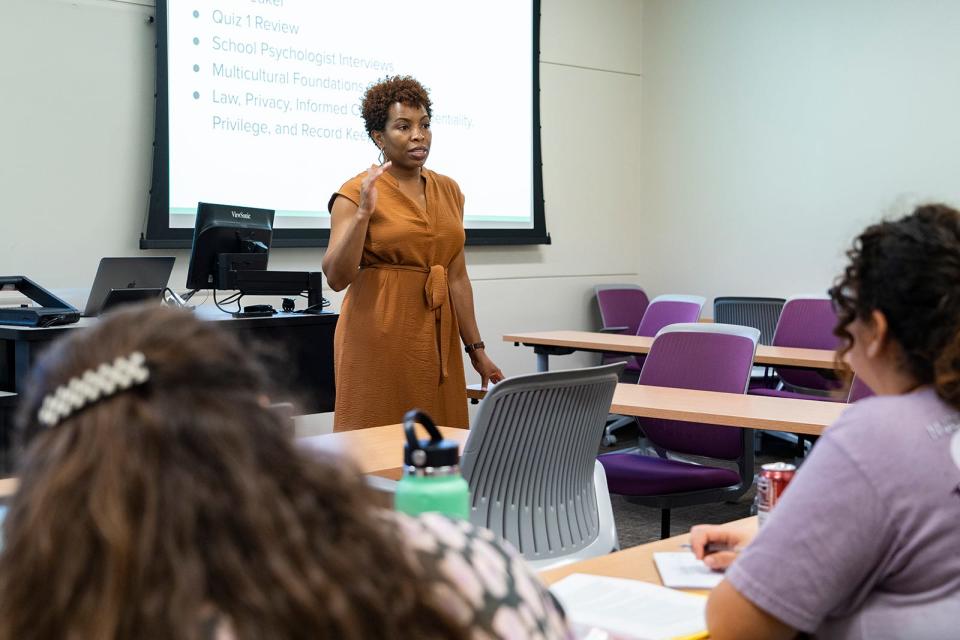School psychologist shortage plagues Texas districts, contributes to AISD special education woes
For years the Austin school district's special education department has been crippled by its struggle to employ and retain enough school psychologists to address students' needs. Last week, the district agreed to a proposal by the Texas Education Agency to place a state-appointed monitor in its special education department to help it get its hundreds of overdue student evaluations for services into compliance and avoid stricter sanctions.
Austin schools have faced unique and persistent issues in dealing with special education student evaluations, but many districts across the state have also struggled to hire and retain licensed school psychologists, who can often find better pay and work flexibility in private companies or aren't attracted to the profession at all.
Statewide, about 2,100 people are employed as licensed school psychologists — about one for every 2,617 students, according to the Texas Association of School Psychologists. That’s a far cry from having one school psychologist per 500 students, as recommend by national organizations, said Jenna Becker, the association's president and a licensed specialist in school psychology who works in the Dallas area.
Texas programs produce about 200 licensed school psychologists every year, Becker said. But the problem is that many of those specialists don’t keep working in public schools, she said.
“There’s a lot of contract companies that exist in Texas that offer a lot better benefits that school districts can’t offer,” Becker said.
Contract companies can let their employees work from home sometimes, have flexible work hours or choose their caseload — all options that aren’t available to school districts, which must work within the rigid school day. Private companies also typically pay their psychologists higher salaries.
Fewer than half of the 580 licensed school psychologists in the Austin area work directly in schools. Only about 250, or 43%, work in schools, according to the association. Average pay in the Austin-area — $67,095 — is lower than the state’s average of $72,244, according to association data.
These licensed school psychologists can evaluate students for special education services, a federally regulated process, but can also offer some counseling, therapy and other services. People with other certifications can perform some of these or different tasks. Schools also face shortages of people qualified to work with special education students, experts have said.
The Austin district this year has made strides to bolster its staff by tripling its evaluators from 22 to 74 licensed school psychologists and diagnosticians.
The Austin area actually fares better than the state in maintaining a better ratio of school psychologists to students. The Austin area employs about one school psychologist per 1,502 students, still about three times as many students per specialist as recommended by the National Association of School Psychologists.
If all the licensed school psychologists in the state worked at public schools, that ratio would be closer to 1,500 students per specialist, Becker said.
More: AISD, parents concerned with the Texas Education Agency's proposed special education plan
Texas is one of just eight states with a ratio greater than 2,000 to 1, according to the national association.
“We still need to be licensing more school psychologists,” Becker said.

It is a heavy lift to become a school psychologist, said Kizzy Albritton, an associate professor in the University of Texas' educational psychology department.
Students have to complete a masters program, which can typically take three years, to become a school psychologist. “We’re not talking a quick fix,” Albritton said.
The training is very specialized and can’t be truncated, she said.
Texas is also operating with a deficit of school psychologists because of history issues, said Katie Tackett, associate professor of practice in UT's special education department.
For years, the state encouraged districts to cap the number of students receiving special education services, which meant lower demand for evaluators and other special education teachers.
In 2017, only 9.2% of Texas students were in special education. In 2021, about 11.7% received special services, according to the Texas Education Agency.
“AISD has the spotlight on it, but they’re not alone,” Tackett said. “They just happen to be the district that’s been called out, and deservedly so.”
Political opposition to social and emotional learning and to policies that help LGBTQ+ students tends to drive away mental health experts who fear that highly charged climate would affect their work, she said. Becker also worries that a recent state law banning diversity, equity and inclusion programs in colleges will dissuade professors who could teach future school psychologists from coming to Texas.
If Texas wants to attract more people to school psychology, it will probably take a societal shift in the way the public thinks about disability, Tackett said.
“We still think about disability in terms of this charity model and so people who are ‘called’ to work with disabled people must be so charitable and patient,” Tackett said.
Because of that, many people don't consider the profession an option, she said.
"I think personally, all teachers should be coming out dually certified in special education and general education major," Tackett said.
This article originally appeared on Austin American-Statesman: Education in Texas: school psychologist shortage plagues districts

